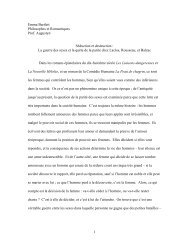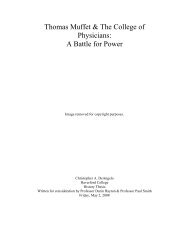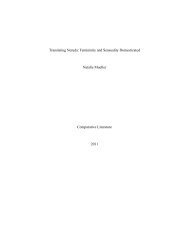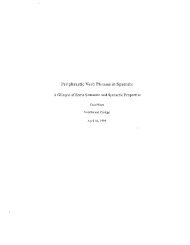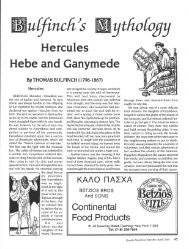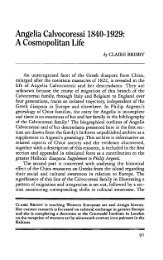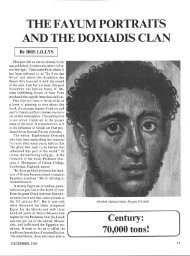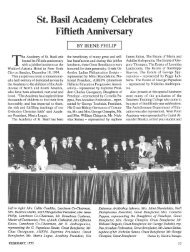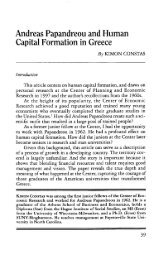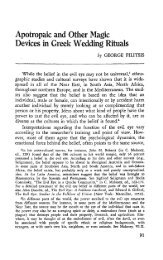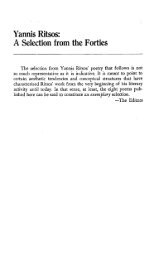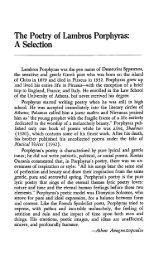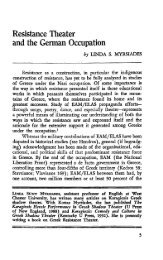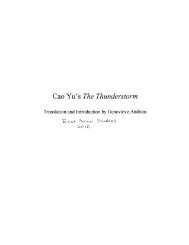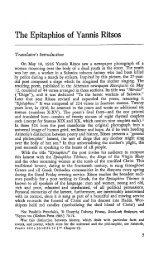Mythistorema - Triceratops Home
Mythistorema - Triceratops Home
Mythistorema - Triceratops Home
Create successful ePaper yourself
Turn your PDF publications into a flip-book with our unique Google optimized e-Paper software.
40 JOURNAL OF THE HELLENIC DIASPORA<br />
hands—that of his father—which is a symbol of the heavy task he has to<br />
carry out to avenge his death: to kill his own mother. Orestes did not<br />
choose his fate, he was born with it. His father was slain when he was<br />
very young; his head "was falling into the dream as I [Orestes) rose<br />
from the dream." Thus, he sees his life as a continuation of that of his<br />
father. He has the hallucinatory impression that the marble head is alive<br />
and his father's lips are trying to speak to him. This whole experience is<br />
psychologically so exhausting that he feels as if his hands holding the<br />
marble head at certain moments are no longer there and at others "come<br />
back to [him),/Maimed. , '<br />
On the other level, which is somewhat more ambiguous, the protagonist<br />
is the contemporary Greek, for whom the marble head represents<br />
tradition, the heritage of a "tremendous past" so overbearing that his<br />
present life—limited, wasted, mediocre—bends under its disproportionate<br />
burden. There is, however, another aspect of this level, more personal,<br />
which makes it also more credible, since without it the preoccupation<br />
with the past would seem a little excessive. This is the modern protagonist's<br />
identification with the Atreus family, the possibility that he too<br />
was implicated in an unspecified act of hubris, as can be seen also<br />
in Seferis' poems "Saturday" and "In the Manner of G.S." In the<br />
former the protagonist sees life as a perpetual reenactment of an ancient<br />
tragedy with the same mechanism of hubris and justice at work, while<br />
in the latter he specifically mentions that he "slept beside them [the<br />
Atreus family)" at Mycenae.' He feels the burden of a hubris which<br />
makes him identify with Orestes. The poet is very ambiguous about it,<br />
but there must have been some traumatic experience in the protagonist's<br />
past, the nature of which remains unclear. This would explain the fact<br />
that the tormenting situation that rends the protagonist is much more than<br />
what would be justified by the burden of a great past.<br />
This idea of tradition, conveyed by the symbol of the heavy stones<br />
and related to an act of hubris (hinted at by the condemnation of the<br />
protagonist), is stated more specifically in the poem "Mycenae":<br />
Needs must he sink who carries the great stones;<br />
These stones I have carried as long as I was able,<br />
These stones I have loved as long as I was able,<br />
These stones my fate.<br />
Wounded by my own soil<br />
Tortured by my own garment<br />
Condemned by my own gods,<br />
These stones.<br />
The predicament of modern Orestes and the act of hubris he has<br />
committed reappear more explicitly in poem "16" of this sequence.<br />
'This line suggests that the protagonist feels as if he shares, in a way, the<br />
hubris and the fate of the Atreus family.



